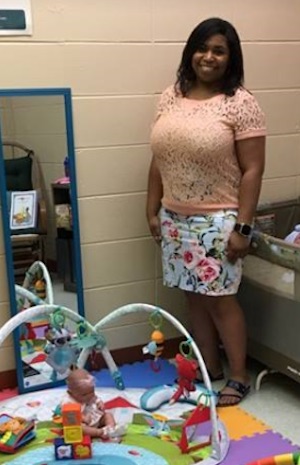Published 2018
Perinatal High-Risk Case Management: Addressing Barriers for Expectant and Parenting Teens
Program Description
Perinatal High-Risk Case Management: Addressing Barriers for Expectant and Parenting Teens, offered by the Mississippi State Department of Health, provides intensive case management and home visiting to help teens to succeed in school and parenting.
- Population: Expectant and parenting teens (ages 17-19) enrolled in high school, a GED program, or alternative school program who do not otherwise qualify for Medicaid-reimbursed case management services, and their infants (up to one year old)
- Locations: 34 counties in eastern Mississippi. Direct services are offered in six counties, with consultation provided in the remaining 28 counties
- Partners: Mississippi Division of Medicaid; District IX Fetal Infant Mortality Review Community Action Team/ Advisory Group; Lauderdale County/NFusionX Governance Council; Jones County MAP Team; Mississippi Action Network for Uplifting Promise (M.A.N. U.P.!); Community Action Network/Tougaloo College; and birthing hospitals and medical providers across the state
Goals
- Connect parents and their infants with a medical home (a usual place for health care that is comprehensive and ongoing).
- Increase father involvement.
- Increase parents’ commitment to staying in school.
- Delay subsequent unintended pregnancy.
Strategies
Multidisciplinary, intensive case management
The case management team includes a social worker, a nurse, and a registered dietician who meet with the teen at least once a month in a clinic or at the participant’s home or school. Case managers help participants learn about infant development, parenting skills, and delaying subsequent pregnancies. Two curricula, “24/7 Dad” and “Partners for a Healthy Baby,” supplement health education provided by the case management team and promote father engagement in parenting.
The case management team makes referrals and helps arrange transportation to connect participants with local organizations that provide housing, financial services, and parenting classes. They also help participants access available educational opportunities, including home-based education supported by the school district, virtual high school, and GED programs. “Teen specialists”—social workers with expertise in case management for expectant and parenting adolescents—offer direct services in six counties and provide consultation on best practices to case managers to the 28 remaining counties.
Outreach and community engagement
Program staff meet with high school personnel, including counselors, nurses, and district officials, as well as attend community and professional events, to raise awareness of the program at the local, regional, and state levels. Recently, the program published an editorial in the Mississippi School Counseling Association’s monthly newsletter and exhibited at the Mississippi Nurses Association’s annual conference. State-level outreach happens at least once a week, and local outreach at least monthly.
Stats at a Glance
- 1,072 participants served (2015-2017)
- 100% participants were linked to a medical home (2015-2017)
- 73% school-eligible participants remained in school while receiving case management (2017)
- 56% increase in enrollment of father participants between year one and year two
- 97% female participants in 2016 did not have a pregnancy in the year following the program
In Focus: A Place for Parents to Learn
 When Jillian Harper, a social worker at the Mississippi State Department of Health, saw that young mothers weren’t equipped with the parenting skills they needed, she created an interactive parenting station in a spare room of the Jones County Health Department. Using donated items from the community, she and other staff offered hands-on guidance in parenting and infant care skills to participants in the Perinatal High-Risk Case Management program. The parenting station was so successful that it’s expanding into a larger space with sections devoted to safe sleep, bathing, car seat safety, diapering, feeding, developmental tasks and play, and life skills for young parents.
When Jillian Harper, a social worker at the Mississippi State Department of Health, saw that young mothers weren’t equipped with the parenting skills they needed, she created an interactive parenting station in a spare room of the Jones County Health Department. Using donated items from the community, she and other staff offered hands-on guidance in parenting and infant care skills to participants in the Perinatal High-Risk Case Management program. The parenting station was so successful that it’s expanding into a larger space with sections devoted to safe sleep, bathing, car seat safety, diapering, feeding, developmental tasks and play, and life skills for young parents.
Grantee Information
Danielle Seale
Director of Women’s Health
601-576-7477
danielle.seale@msdh.ms.gov
www.msdh.ms.gov/
Print the full success story here.
About the PAF Program
The Office of Adolescent Health Pregnancy Assistance Fund (PAF) program provides funding to states and tribal entities to improve the health, educational, social, and economic outcomes of expectant and parenting teens, women, fathers, and their families.
 An official website of the United States government
An official website of the United States government